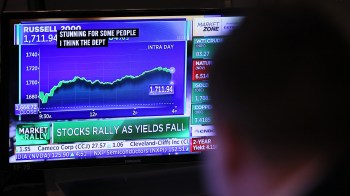If the DOW is closed for a holiday and no one is around to trade, does it still make a sound?
If the DOW is closed for a holiday and no one is around to trade, does it still make a sound?
It happens all the time, U.S. stock markets close for uniquely American holidays like Martin Luther King, Jr. Day and President’s Day, Hong Kong’s stock exchange closes for the Buddha’s Birthday and the Lunar New Year.
It’s mostly not a big deal, but there are subtle (and sometimes not so subtle) changes during these events that show just how connected our global financial system is.
LESS VIBRANT, LESS VOLATILE
“Often, holiday markets are less vibrant than days when major market centers are not closed,” says Andy Brooks, a Vice President at T. Rowe Price. Institutional investors will try to avoid global transactions, because “it’s kind of hard to effect a transaction when most people aren’t there.”
In fact, markets are measurably less volatile, according to University of Houston finance professor Craig Pirrong. That’s because people trade on information, and they get information from trading. Less of one means less of the other, and in a global economy, information has no boundaries.
MARKETS LISTEN TO EACH OTHER. WHEN ONE IS QUIET, THERE’S LESS TO TALK ABOUT.
“The trading process itself generates information about the value of stocks,” says Pirrong. For example, people watch one another to see how they react – almost like a poker game. Who’s buying? Why did that mutual fund just dump a bunch of shares? “So, to the extent that there’s less information being generated by the trading process in the U.S., that means there’s less information in these other markets.”
BUT WHEN EVERYONE’S BACK TO THE PARTY, THERE’S ALWAYS GOSSIP TO CATCH UP ON
The next day when a market opens, everyone has to catch up on what news that did occur. “When the markets open, they have to incorporate all this news into stock prices very quickly,” says John Elder, professor of finance at Colorado State. As a result, once “we see higher average volatility.”
Elder says you can see this even after a weekend, “On Mondays for example, markets tend to be more volatile than on Wednesdays.”
BUT LET’S NOT OVERBLOW THIS
Heather Brilliant is head of equity and corporate research for Morningstar, where she takes the long view. “A planned market closure is generally not a big deal.”
Still, once in a while, weird things can happen, a stock might move dramatically in Hong Kong while its price is frozen in the U.S., or you can get very one-sided market reactions to a given piece of news. “Let’s say a company reported earnings today in Europe and investors didn’t like the earnings, and many people wanted to get out. Well, perhaps if the U.S. market had been open,” says Brilliant, “there would be enough countervailing people interested in buying that stock.” But the U.S. market isn’t open, and in Europe everyone is very pessimistic about this company and overwhelmingly dumps the stock. “Therefore, the price could go down more than it would otherwise.”
But again, this tends to get corrected once all markets are open again.
AND A WORD OF WARNING FOR INVESTORS
All in all, when one market is out of the game, the others are a little duller and sometimes a little bit weirder, and it’s usually temporary, which leaves T. Rowe Price’s Andy Brooks with a word to the wise: “Investors should be wary to take any market moves made during holiday markets as having incredible significance, because you will often see a recalibration when everyone gets back to work.”
There’s a lot happening in the world. Through it all, Marketplace is here for you.
You rely on Marketplace to break down the world’s events and tell you how it affects you in a fact-based, approachable way. We rely on your financial support to keep making that possible.
Your donation today powers the independent journalism that you rely on. For just $5/month, you can help sustain Marketplace so we can keep reporting on the things that matter to you.


















